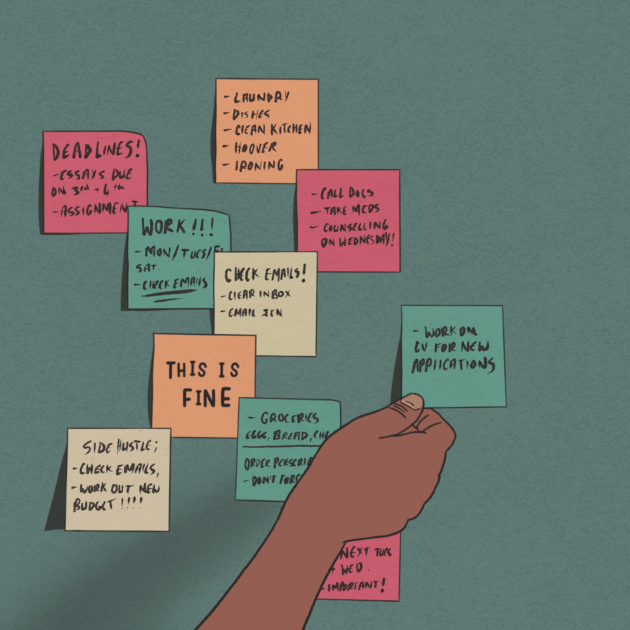How society influences burnout
Many of us feel under pressure to be productive all of the time. Living in a capitalist society may have influenced your beliefs about productivity.

Burnout does not occur simply as a result of poor time management or taking on too many tasks. There are societal systems and beliefs that influence how we approach work and tasks and ultimately, how they affect us.
Societal systems and burnout
If you are experiencing burnout or stress, try not to blame yourself. It is important to know that there are factors outside of your control that can affect your wellbeing. The capitalist system and its influences on our beliefs is one of these factors.
What is capitalism?
Capitalism is an economic system in which businesses are owned and controlled by private individuals or groups of individuals rather than the government. They make decisions with the aim of making a profit and employ workers to allow them to do so.
In a capitalist system, the value of goods and services is determined by the economy. A product’s value depends on how much people want it and how much of it is available. This is known as supply and demand. Competition between businesses is encouraged as it ideally prevents one company or individual from controlling an entire part of the economy. This competition can also help to keep prices low and lead to more innovation in an industry. With capitalism, people are free to buy whatever they want if they have the money to do so.
Who benefits from capitalism?
Capitalism generally favours people who own businesses and property. A company owner who employs workers and sells a lot of goods or services can make a large profit. The higher their sales and the lower their production costs, the more profit they can potentially make.
Capitalism can also benefit consumers. Competition between businesses helps to keep prices low and makes certain products more accessible.
Who does not benefit from capitalism?
The fact that the capitalist system is driven by profit can be problematic for those who work within it. If a company is focused on making as much money as possible, it is in their interest to keep costs low while keeping production levels high. This can result in worker exploitation. Through subtle manipulation or more forceful behaviour, a person might be encouraged to work long hours, sometimes without adequate breaks or fair pay. Constant productivity is often valued and praised above all else in these work environments. This can make it difficult for people to recognise exploitation for what it is.
The capitalist system can also reinforce and drive inequality and oppression within society. For example, some people face barriers to or are excluded from education such as people with low incomes and people with disabilities. Societal racism also excludes large numbers of people who experience racism from having equal education opportunities. As a result, these groups will have fewer employment opportunities. They may be left with no option but to take on low-paid and precarious work that has limited opportunity for advancement.
Capitalism requires people to continue to want and purchase new products in order to work. This focus on consumption and production contributes to environmental issues such as the depletion of natural resources, pollution and climate change. While businesses may benefit in the short term, these environmental issues will ultimately negatively impact everyone. This is particularly true for poorer nations. They may not have the resources or infrastructure to protect themselves from the devastating effects of climate change.
How does capitalism affect how we think about productivity?
Many of us feel under pressure to be productive all of the time. This can be a result of internalised capitalism.
Internalised capitalism is the idea that your self-worth is directly linked to your productivity or how well you can perform in a capitalist society. You might be experiencing internalised capitalism if you:
- Often feel guilty for resting
- Prioritise work over your wellbeing
- Always feel like you should be doing more
- Believe you are lazy for resting, even if you are experiencing pain, trauma or adversity
- Worrying that you should be further along in your life/ career than you are
Everyone who lives in modern society is vulnerable to absorbing the idea that their value as a person is directly connected to what they do. However, everyone will experience internalised capitalism differently. It can be influenced by the environment and people around you.
Workplace cultures (the collection of values, expectations, and practices that guide the actions of all team members) that praise and even reward overworking can reinforce the belief that your worth is linked to your work. Whether you work in this kind of environment or not, you are likely to be exposed to the culture of overworking in social situations and through social media. ‘Hustle’ culture or ‘grind’ culture – the belief that you have to work all day every day to be successful – is amplified on social media. Some influencers encourage followers to take up multiple side hustles and turn their hobbies into money-making opportunities. Constant exposure to these ideas can lead people to believe that they need to be always ‘on’ and always working. They might feel guilty for resting or doing anything that isn’t seen as productive from a money making perspective.
Rebuilding your beliefs about productivity
It can be challenging to overcome beliefs about success and work when you live in a society that places a high value on productivity. However, building awareness is the first step. Notice if you have negative associations with rest and not being productive. Ask yourself whether these are your beliefs or the result of living in a society that promotes this idea. If it is a case of the latter, know that you can unlearn this. It is important to know that your value and worth as a person does not depend on being productive all of the time.
Even if you recognise that your worth is not tied to your productivity, it is possible that you still feel trapped in the cycle of overwork. Many people are stuck in environments where they are encouraged and rewarded for overworking. If you work in this kind of environment and you rely on the income from this work to survive, it can be challenging to change your approach to work.
You may not be able to dismantle societal structures and beliefs around work, but there are things you can do to reduce their negative effects on your wellbeing and prevent burnout.
What can I do about burnout?
Societal structures such as capitalism are one of many factors that can influence your burnout. It is important to know that there are many factors contributing to burnout that are within your control. Find out more about what causes burnout and what you can do to prevent burnout.
Feeling overwhelmed and want to talk to someone?
- Get anonymous support 24/7 with our text message support service
- Connect with a trained volunteer who will listen to you, and help you to move forward feeling better
- Whatsapp us now or free-text SPUNOUT to 50808 to begin.
- Find out more about our text message support service
If you are a customer of the 48 or An Post network or cannot get through using the ‘50808’ short code please text HELLO to 086 1800 280 (standard message rates may apply). Some smaller networks do not support short codes like ‘50808’.






